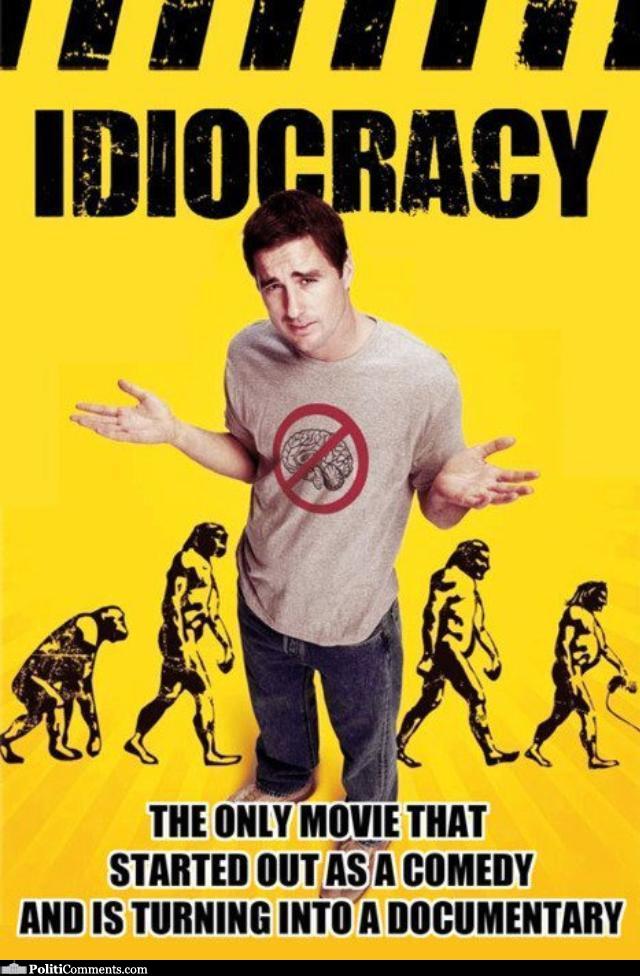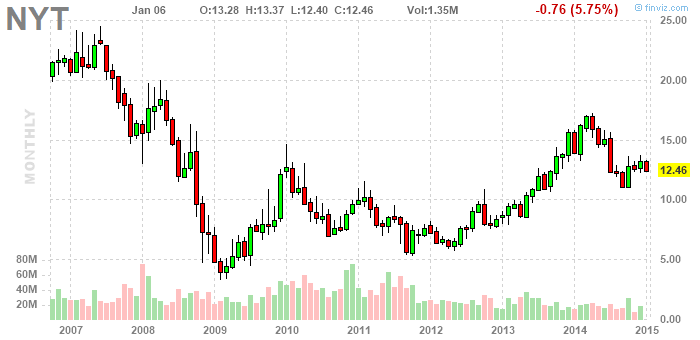|
Consumer Nation: Idiocracy Replaces Democracy
Daniel Drew, 1/6/2015 
Tweet "As the 21st century began, human evolution was at a turning point. Natural selection, the process by which the strongest, the smartest, the fastest, reproduced in greater numbers than the rest, a process which had once favored the noblest traits of man, now began to favor different traits. Most science fiction of the day predicted a future that was more civilized and more intelligent. But as time went on, things seemed to be heading in the opposite direction. A dumbing down. How did this happen? Evolution does not necessarily reward intelligence. With no natural predators to thin the herd, it began to simply reward those who reproduced the most, and left the intelligent to become an endangered species."It has never been a pastime of mine to focus on the mental shortcomings of others, but the levels of intellectual decline have reached critical levels. The other day, a popular website known as "BuzzFeed" was brought to my attention. For those of you who are unfamiliar with it (most of you I hope), it is a focal point for the mindless who wish to read groundbreaking articles such as "31 Pictures That Prove 2015 Will Be The Cutest Year of All Time," "16 Reasons Tara Reid Has the Best Vacations," and "This Is What Happens When You Pretend to Be a Bagel on Tinder." Not only is this content not helpful, it actually makes you dumber when you read it. It is an opportunity cost because you could be reading something else. Even worse, some of the material has been conclusively identified as plagiarized. The BuzzFeed editor-in-chief apologized in July 2014 after finding 41 instances of plagiarism - because it's so hard to write about 10 Reasons Why We Love Miley Cyrus without plagiarizing. I became curious just how popular such material actually is. CuteStat is a website that allows you to see how much traffic a website usually gets. The New York Times website has about 10.3 million daily viewers and 83 million daily page views. Now brace yourself: BuzzFeed has 10.9 million daily viewers and 87 million daily page views. More people are interested in visiting BuzzFeed to see cat pictures, Justin Bieber, and all the related pop culture garbage than they are in reading The New York Times, which for the most part, contains in-depth articles about the world's most pressing issues and world class journalism. The New York Times has been in decline for years. Revenue is down 50% from the high point. Subscriptions were declining until they started offering digital subscriptions, but that has not offset the decline in advertising revenue. Meanwhile, BuzzFeed just hit $100 million in revenue in 2014. The most recent round of venture capital investment valued the company at $850 million. The New York Times is valued at $1.9 billion, but for how much longer? The decline of the Times mirrors the decline of intelligence in American society. 
What kind of signal does this send to the market? It sends a signal to New York Times shareholders to sell their stock and to invest in shoddy content producers like BuzzFeed, which would be more accurately called MindKill. Pure capitalism is nothing but a battleground where supply and demand interact. Where the demand is, the supply will also be. In this case, the demand is for stupidity - or things that make us stupid. We crave content that destroys our critical thinking abilities. The same way you can find someone to sell you heroin, you can find someone to provide you with all the idle chatter, endless lists of meaningless trivia, celebrity gossip, and ill-conceived self-improvement advice you could ever want. The fact is the business model of intelligent responsible journalism is declining and will eventually cease to exist. Why should you pay someone to conduct rigorous investigations into congressional behavior or corporations when you can hire a college intern to write the next viral piece: 27 Reasons Why Taylor Swift Is the Greatest Person of All Time? Not only is the quality of the material reaching unimaginable levels, the advertising has become completely dishonest. In the latest trend of disingenuous corporate behavior, "native advertising" is replacing the traditional advertisement. Usually, you can recognize an ad immediately. But native advertising aims to change that with the stealthy blending of content and advertisement. For example, I just saw this article on the BuzzFeed home page: 12 Reasons Life Is Just Better In the Mountains. It sounds like any of their other mind-killing lists, but it's actually an ad by Travel Alberta. The American economy depends on the consumer. Consumer spending as a percentage of gross domestic product has been on a steady trend higher for years. The more of a consumer zombie the average person becomes, the higher our GDP will be. Is this a BuzzFeed problem? A Facebook problem? Who came up with this stuff? In 2002, 2 years before Facebook even existed, there were a few harbingers of the decade to come. The popular Tom Cruise movie Minority Report was released, which was based on the Philip Dick short story from 1956. The movie is quite complicated, but what I want to focus on is the type of advertising that takes place in the futuristic world: facial recognition billboards. The billboards call out your name as you walk around, enticing you to buy their product, and they will talk to you like they have known you for years - because they have. The other harbinger was "Feed," a novel which is like The Matrix, but without all the kung fu. Instead of battling evil robots, the battle is against the advertisers. It is set in the future when people's brains are directly connected to "feednet." Basically, it's just a more advanced version of what Facebook is today. I would be surprised if Mark Zuckerberg did not read this book before founding Facebook. Perhaps Matthew Anderson, the author of Feed, should sue Zuckerberg. It certainly would be more compelling of a case than the lawsuit filed by the Winklevoss twins. If you read Feed, you'll have a hard time not thinking about Facebook. Feed was released in 2002. Facebook emerged in 2004, and in 2006, the real "feed" on Facebook went live. Another type of advertising that probably really annoys you is sponsored content, or "content you may like." It typically features some of the worst of the web - possibly even more degrading than Buzzfeed. These are ads served to you courtesy of Outbrain and Taboola. In response to criticism, Yaron Galai, CEO of Outbrain, said, "Sadly, what you see is many times what the audience is engaging with the most." In a world where algorithms run wild, stupidity has been mass produced with an efficiency that has never been seen before. The first comment in New York magazine's article about BuzzFeed is the most telling, "God this article was depressing. What a smart guy - can you imagine what he could do if he put that brain to work for good instead of Buzzfeed?" But the market has spoken. On the one hand, who am I to dictate the desires of others? On the other, what if everyone is wrong? The whole concept of a democratic society is that people should rule themselves. But what if society reaches a point where people become so consumed with 10 Reasons Why They Love Cats that they don't even know who is running for office in the next election? Have these people become completely incapable of governing themselves? When the average person is pondering the meaning of Taylor Swift's next album, anyone with half a brain who isn't reading BuzzFeed is, by default, a member of the nation's newest generation of philosopher kings. Jonah Peretti, the MIT-bred brains behind BuzzFeed, could be considered the modern day capitalist version of a philosopher king. Instead of using his intellect to advance the city-state, he is using it to figure out how he can make the most money possible from the intellectual laziness of 10.9 million people every day. How do you even describe an industry like this one? He is creating algorithms for stupid people. His job is how to program computers to figure out what idiots will share next. New York reports, "At the meeting, Rosenthal got behind the �screwed by life� ad, which featured bloopers like a picture of a dog turd left in someone�s shoe. �These posts tend to do really well,� she said. There was animated discussion about the proper presentation of the turd."There was animated discussion about how to present the issue of CEO pay and conflicts of interest? No, the discussion was about dog shit. Could there be a more appropriate metaphor for what takes place at every meeting in corporate America? In discussions like these, it can be easy to fall to criticism of being an elitist, but this isn't about that. It's about a widespread decline in the intelligence, goals, and ambitions of the average person. It shouldn't be "elitist" to read The New York Times instead of BuzzFeed. It shouldn't be elitist to seek out a career that doesn't involve creating algorithms to manipulate those with lesser intelligence or ambitions. It shouldn't be elitist to expect a work meeting agenda that doesn't revolve around literal dog shit. So we come to a fork in the road, where all that lies before us is the tyranny of the philosopher kings, who dictate their will to the BuzzFeed masses, and the stupidity of the new majority, who dictate their will via 10 Things We Hate About Dressing Up, which is apparently some loosely connected variation of Martin Luther's 95 Theses, or 95 Reasons I Don't Like Church. But this is what democracy is supposed to be about anyway: mob rule, the tyranny of the majority. If the mob demands their Justin Biebers and their endless cat videos, then that is what they shall get. Maybe idiocracy hasn't replaced democracy after all. We have become both: the United States of America, a democratic idiocy. |